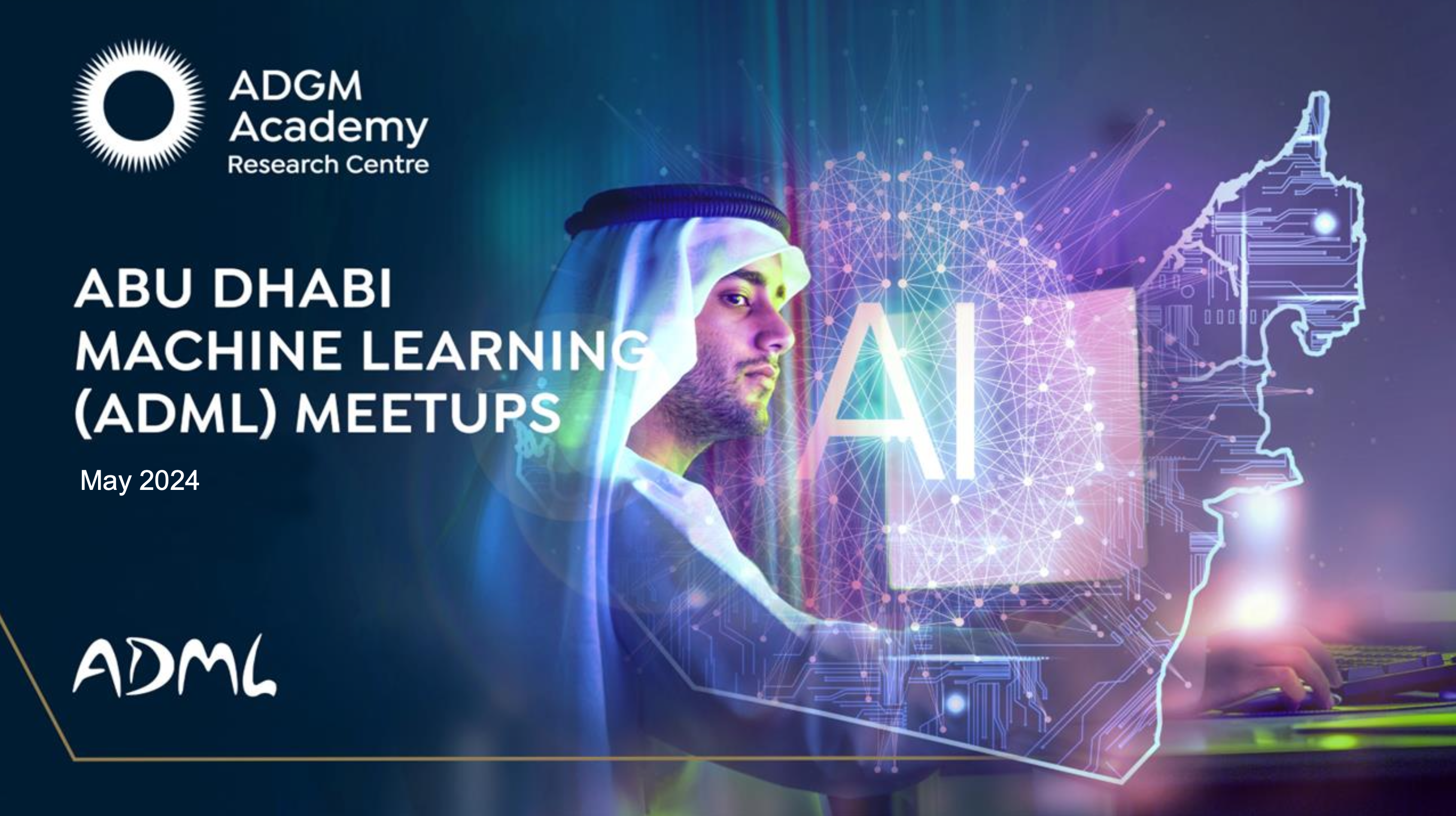
Abu Dhabi Machine Learning Season 5 Episode 2
28.01.2025 - Abu Dhabi Machine Learning - ~4 Minutes
When?
- Tuesday, January 28, 2025 from 6:00 PM to 8:00 PM (Abu Dhabi Time)
Where?
- ADGM Academy, 20F, Al Maqam Tower, Al Maryah Island, Abu Dhabi
The Meetup page of the event:
Abu Dhabi Machine Learning Meetup Season 5 Episode 2
Programme:
Talk 1: LLMs - From origins to reasoning models
Abstract: In this talk, we explore the fascinating evolution of Large Language Models (LLMs) and their transformative journey through the lenses of computation and optimization. We begin by tracing the origins of LLMs, highlighting how advances in computation and optimization were pivotal in their development. We then delve into the key optimizations that have achieved a staggering 1,000x cost reduction, making LLMs widely accessible even on portable devices. Moving forward, we address the limitations of human-generated data and introduce the concept of constructive hallucination in LLMs. This technique allows for the generation of new hypotheses and their validation through reasoning chains, pushing the boundaries of knowledge creation. Next, we provide an overview of the technology fundamentals and early successes of reasoning models, such as OpenAI’s o1 and o3 preview. These models, while significantly enhancing computational capabilities, also exponentially increase computational demands. Finally, we conclude by presenting our ambitious Ultra Ethernet effort, which aims to establish the interconnect standard for future AI workloads. This initiative is crucial in meeting the growing demands at the system level, ensuring seamless and efficient operation in the age of reasoning models.
Speaker: Torsten Hoefler is a full professor at ETH Zurich where he directs the Scalable Parallel Computing Laboratory (SPCL). He is also the Chief Architect for Machine Learning at the Swiss National Supercomputing Center and a Long-term Consultant to Microsoft in the areas of large-scale AI and networking. He received his PhD degree in 2007 at Indiana University and started his first professor appointment in 2011 at the University of Illinois at Urbana-Champaign.
Talk 2: Causal Learning from Real World: Methodologies and Applications
Abstract: Causality, the science of uncovering cause-and-effect relationships, forms the foundation of scientific exploration and practical decision-making. By distinguishing between mere correlations and structural dependencies, causal analysis enables the prediction of outcomes, the design of interventions, and the understanding of mechanisms underlying complex systems. Despite remarkable progress in the development of theoretical frameworks and computational methods, some key challenges still remain. In this talk, I will present two of our recent works: one addressing the issues of deterministic relations in causal discovery, and the other focusing on causal representation learning from biological observations. In both works, we developed flexible identification conditions and principled methods to facilitate the understanding of real-world biological datasets.
Speaker: Loka Li is a third-year Ph.D. student in the Department of Machine Learning at the Mohamed bin Zayed University of Artificial Intelligence (MBZUAI), supervised by Prof. Kun Zhang. His research interests center on machine learning and causality. Recently, he mainly focusses on causal discovery and causal representation learning, particularly in the context of biological datasets. He obtained his Master’s degree in Computer Science at the University of Hong Kong (HKU). His publications have appeared in top AI conferences, including NeurIPS, ICLR, AAAI, ICCV, and ECCV.
References:
- Loka Li, Haoyue Dai, Hanin Al Ghothani, Biwei Huang, Jiji Zhang, Shahar Harel, Isaac Bentwich, Guangyi Chen, Kun Zhang. “On Causal Discovery in the Presence of Deterministic Relations.” NeurIPS, 2024.
- Yuewen Sun, Lingjing Kong, Guangyi Chen, Loka Li, Gongxu Luo, Zijian Li, Yixuan Zhang, Yujia Zheng, Mengyue Yang, Petar Stojanov, Eran Segal, Eric P. Xing, Kun Zhang. “Causal Representation Learning from Multimodal Biological Observations.” arXiv, 2024.
Talk 3: Enriching Datasets with Demographics through Large Language Models
Abstract: Enriching datasets with demographic information, such as gender, race, and age from names, is a critical task in fields like healthcare, public policy, and social sciences. Such demographic insights allow for more precise and effective engagement with target populations. Despite previous efforts employing hidden Markov models and recurrent neural networks to predict demographics from names, significant limitations persist: the lack of large-scale, well-curated, unbiased, publicly available datasets, and the lack of an approach robust across datasets. This scarcity has hindered the development of traditional supervised learning approaches. In this paper, we demonstrate that the zero-shot capabilities of Large Language Models (LLMs) can perform as well as, if not better than, bespoke models trained on specialized data. We apply these LLMs to a variety of datasets, including a real-life, unlabelled dataset of licensed financial professionals in Hong Kong, and critically assess the inherent demographic biases in these models. Our work not only advances the state-of-the-art in demographic enrichment but also opens avenues for future research in mitigating biases in LLMs.
Speaker: Khaled AlNuaimi is a Research Specialist at the Abu Dhabi Investment Authority (ADIA). Khaled focuses on developing data-driven investment signals to guide investment decision-making. With over a decade of financial expertise, a Chartered Financial Analyst (CFA) designation, and a Master’s in Computational Data Science, Khaled brings a robust analytical foundation to his work. Currently pursuing a PhD in Engineering at Khalifa University, his research bridges Data Science, Natural Language Processing, and Finance to advance investment insights and strategy development.